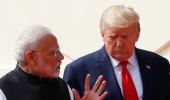With Donald Trump all set to become US president, Indian exporters may face high customs duties for goods like automobiles, textiles and pharmaceuticals if the new US administration decides to pursue the 'America First' agenda, opined trade experts.

Experts also said that Trump could also tighten H-1B visa rules, impacting costs and growth for Indian IT firms.
Over 80 per cent of India's IT export earnings come from the US, making it vulnerable to changes in visa policies.
The US is India's largest trading partner, accounting for over $190 billion of annual trade.
Global Trade Research Initiative (GTRI) Founder Ajay Srivastava said that Trump may extend tariffs beyond China to include India and other countries.
Trump had earlier called India a "large tariff abuser" and in October 2020 labelled India as the 'tariff king'.
These remarks suggest that Trump's second term could bring tougher trade negotiations, he said.
"His America First agenda would likely push for protective measures, such as reciprocal tariffs on Indian goods, potentially adding barriers for key Indian exports like automobiles, wines, textiles, and pharmaceuticals.
"These increases could make Indian products less competitive in the US, impacting revenue in these sectors," Srivastava said.
However, a tougher US stance on China could create new opportunities for Indian exporters, he added.
The bilateral trade in goods between the two countries stood at $120 billion in 2023-24 as against $129.4 billion in 2022-23.
A GTRI report had earlier stated that according to WTO's World Tariff Profiles 2023, the US also imposes high duties on items like dairy products (188 per cent), Fruits and vegetables (132 per cent), cereals and food preparations (193 per cent), oilseeds, fats and oils (164 per cent), beverages and tobacco (150 per cent).
International trade expert Biswajit Dhar said that Trump would increase tariffs in various sectors as he has to follow his call for MAGA (Make America Great Again).
"With Trump coming to power, we are going to enter a different era of protectionism," Dhar said adding sectors like electronics may get a hit.
He added that as earlier Trump has walked out of Trans-Pacific Partnership (TPP), there could be dark clouds on IPEF (Indo-Pacific Economic Framework for Prosperity).
The 14-nation bloc was launched in Tokyo by the US and other Indo-Pacific countries on May 23, 2022.
"Let us see what he does with IPEF," Dhar cautioned and added that nothing is expected to move in the World Trade Organisation (WTO).
Federation of Indian Export Organisations (FIEO) DG Ajay Sahai said that "we could expect Mr Trump to push for more balanced trade. But trade disputes might arise around tariffs".
Going by the increasing trend of protectionism, Sahai said, the same would continue with tighter immigration rules.
Agneshwar Sen, Partner-Tax and Economic Policy (International Trade), EY India said it may be expected that the US will use high tariffs strategically to onshore manufacturing and change current supply chains.
India could face higher tariffs on exports like textiles, chemicals, pharma and auto/ engineering products, Sen said.
"India would have to either seek alternative markets (which will be difficult) or retaliate with its own tariffs on US exports.
"Alternately, we must be ready for a trade deal that is attractive to the US while not just protecting our current interests but creating newer ones," he added.
Further Srivastava said that Trump has expressed concerns about outsourcing, and while some statements may be campaign rhetoric, India should prepare for possible measures affecting IT exports.
H-1B visa policies are crucial for the movement of skilled professionals, especially from India's IT sector.
"Trump's stricter immigration stance could lead to changes in visa rules, impacting Indian IT professionals and raising costs for Indian IT companies," the GTRI Founder said.
However, he added that Trump is expected to ease labour and environmental standards, which could make it easier for Indian exports to enter the US market.
"Trump would likely push India to align closely with US geopolitical aims, potentially expanding India's role as an alternative supplier in sectors like electronics and pharmaceuticals but potentially limiting India's foreign policy flexibility," he said.
Likewise, India's increasing demand for advanced technology, energy, and capital goods from the US opens avenues for expanding bilateral trade.
Between FY'2020 and FY'2024, India's merchandise exports to America rose by 46 per cent from $53.1 billion to $77.5 billion.
Imports from the US also grew to $42.2 billion last fiscal from $35.8 billion in 2019-20.
On the other hand, trade in services between the two nations expanded from $54.1 billion in 2018 to an estimated $70.5 billion in 2024, a 30.3 rise.
India is also a key destination for American businesses such as professional, scientific, and technical services, manufacturing, and IT.
Washington is the third largest investor. India received $66.7 billion between April 2000 and June 2024.
India buys military equipment and Boeings worth billions of dollars from the US and conducts its over 90 per cent global trade in US dollars.
"The US firms like Google, Facebook gather Terabytes of data every day and earn billions of advertising dollars every year from India.
"Amazon which had to withdraw from China, is the biggest online retailer in India.
"The US earns dollars from India from various engagements and not just trade," Srivastava said.











 © 2025
© 2025